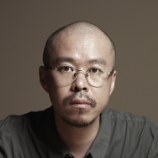 Kim Eun Sung
Kim Eun SungAwards
2010the Daesan Fund for Creative Work (YanbianMama)
2006the Hanguk Ilbo Spring Literary Award(A Constellation of Tailor)
Plays
2012A Tent Theater; Mudflat; Sister Mokran
2011Moon Drama; Loser’s Melodrama
2010Yanbian Mama; Uncle Soon-woo
2007To the End, To the End
2006A Constellation of Tailor
Kim Eun-sungis one of today’s most distinctive and prolific playwrights in Korea today,writing not only original new work but also a series of Korean-stylereconstructions of classics. He raises questions about the origin of drama andthe problems of our times, his drive for writing lying in the greatstorytelling narratives and characterizations of the great playwrights. Kim isa promising writer who starts out from classic plays to confront the problemsof a capitalist society through critical realism. Above all, Kim hasa sound and genuine perspective on his times and the society.


Jury’s Statement
The recipient of 3rd Doosan Yonkang Arts Awards for the Performing Arts went to playwright Eunsung Kim. Debuting with A Constellation of Tailor, which won him the Hankook Ilbo Spring Literary Award, Kim has been extremely prolific since first staging Uncle Soonwoo in 2010. In particular, he has been prolific in his playwriting during the last couple of years. Last year he released Loser’s Melodrama, Yanbian Mama, and 1911 Six-chambered Revolver Robber. This year Moon Drama (the first play performed to commemorate the foundation of Kim’s theater company Dalnara Dongbaekkot), Sister Mokran, and Mudflat have already been performed. A Tent Theater is scheduled to open this October.
His prolific activities producing three to four plays a year back to back, even staging all of them, aside from how good each of his works is, proves how much potential Kim has as a new generation dramatist, and we cannot help but anticipate his next move. His works depict the lives of the downtrodden that cannot keep up with the changes in society. In A constellation of Tailor, the work that made him become famous, the tailor protagonist Im Gong-woo, is a poor fellow who lags behind, not being able to keep up with the fast changes in society. Characters in To the End, To the End (2007), Loser’s Melodrama, and Moon Drama are also failures in society. Recently Kim has been using politically, socially, and ideologically sensitive issues or cases as the background of his works, actively voicing his opinions. Through Yanbian Mama, he touched on the issue of migrant workers of ethnic Korean decent living in China, North Korean defectors in Sister Mokran, and the pain and suffering caused by Gwangju Democratization Movement in Mudflat. In A Tent Theater, set to be staged soon, Kim deals with the conflict between the political left and right as well as the madness of war. These works reveal the underlying social commentary of the playwright on the role of theater in society. As a young playwright, he has contributed to broadening the understanding of theater though looking further into society for source material. Kim has broadened his interest in various historical issues and marginalized people in our society, dealing with social problems head on through his works. We think this attitude toward playwriting serves as a firm stepping stone to reaching maturity as a Korean playwright today. Also worthy of note is the warmth that Kim brings to his subject matter: those who have suffered through life, whatever their circumstances may be. But it is a shame that the low status and struggles of Kim’s characters have to be exaggerated in order to reinforce his message.
We also think that the characters he creates to represent the typical example of social problems appear rough and awkward, which, we feel, is something that he needs to overcome in order to reach maturity in dramaturgy. Kim Eun-sung has been attempting to adapt Western classics to a Korean sentiment for writing practice. Some of the works that had been submitted to us are Uncle Soonwoo adapted from Chekhov’s Dyadya Vanya and Mudflat adapted from Seagull; Moon Drama from The Glass Menagerie by Tennessee Williams; and A Tent Theater, an adaptation from The Traveling Theater Sopalovic by Ljubomir Simovic. This selection of works is unusual for a young artist, and must have served as a training process to develop his abilities as a playwright. Eun-ung Kim has brought the original stories deep into Korean society by borrowing the original plot and characters and turned them into his own works that shed new light on Korean history and society.
For example, the setting and strong vernacular of Mudflat are so reminiscent of Jungrae Jo’s novel Taebaek Mountain Range, that it is easy to forget that it was adapted from Chekhov’s Seagull. In most cases, Korean playwrights are weak in developing logical structure. Kim is no exception. In that sense, imitating and recreating classics can be a very meaningful process in the growth of a playwright’s work. For those who write plays, talent is the ability to locate accurate words to describe a character’s thoughts and feelings; Kim has the ability to find the right words. His language shines more on stage than in print. The real language of a play is a language that shines brightly. The reason why Kim’s plays are meaningful is that we can face the sincerity of laymen’s words that after being buried for an entire life, become suddenly uttered with a poignant urgency. The fact that it is so rare to find a writer that can write the language of everyday life, not the language of ideas, makes Eunsung Kim all the more valuable. Being young, it is true that his perspective on humanity and world is yet loose and sentimental but we believe that his passion will enhance his ability to a higher level and he will grow into an all-embracing writer who can contain a much broader social spectrum in his works.